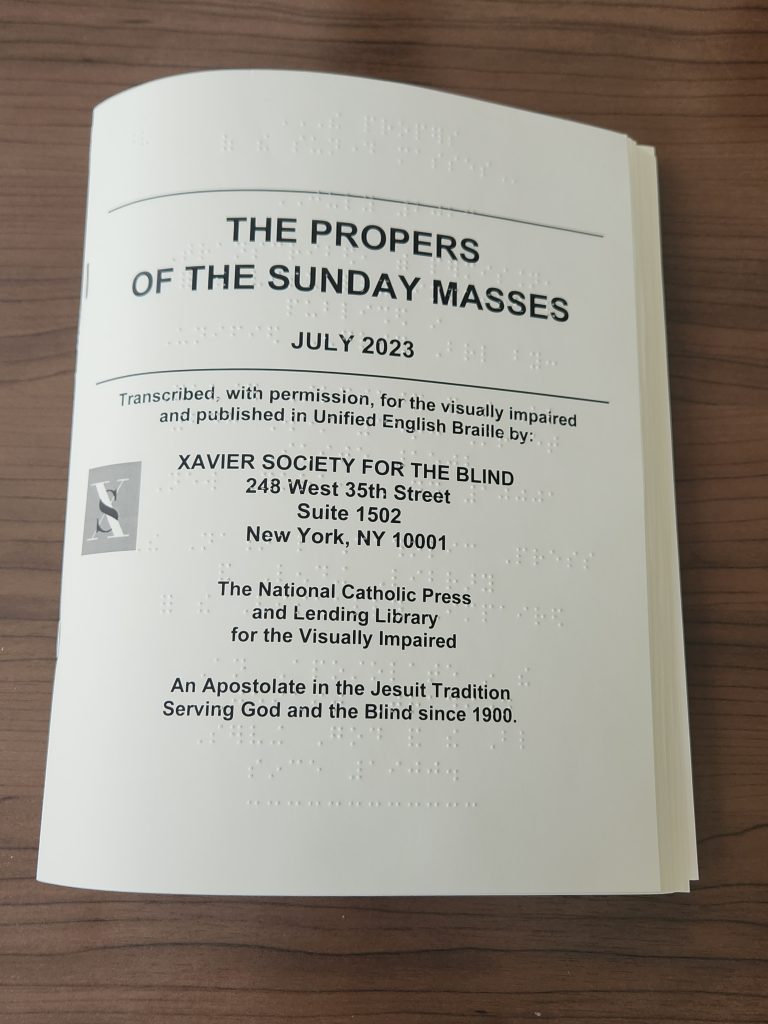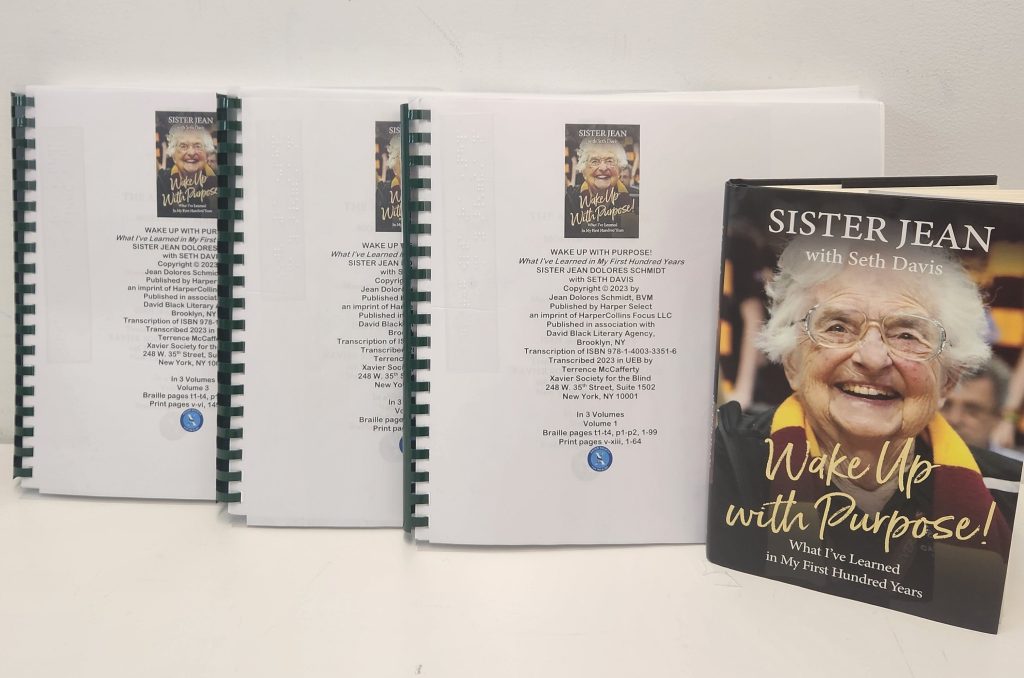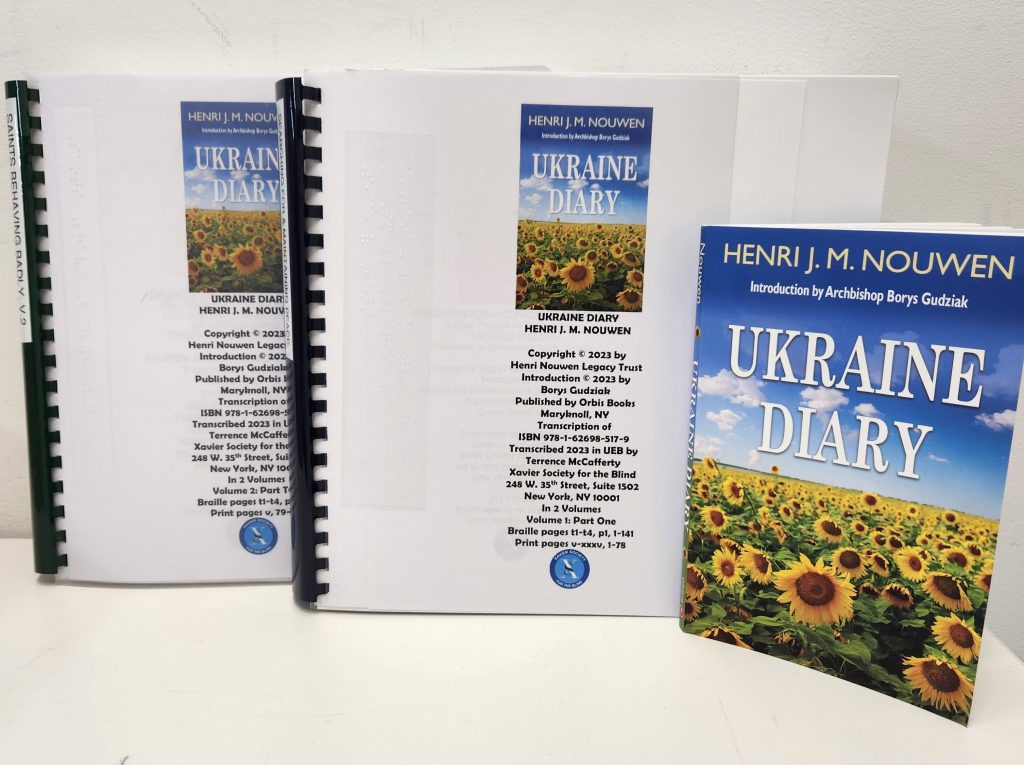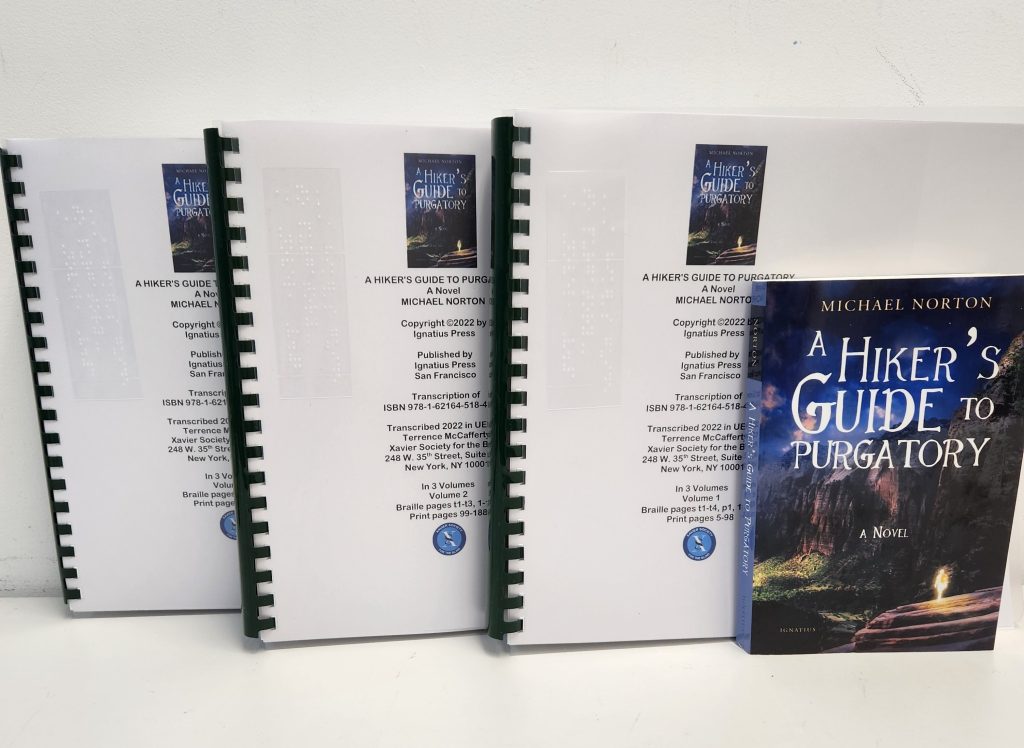July 5, 2023 // Diocese
Free Braille Materials Impact the Mass Experience for the Visually Impaired
Hearing the word of God in Mass is impactful and sometimes comes with questions that further research in the Bible at home can answer. Imagine leaving Mass with a question, being visually impaired, and without the Bible in braille at home.
This is a common occurrence for Richard Poncin, who lost his sight after being hit by a car at the age of seven. Losing his sight comes with a variety of hurdles for his faith life. He relies on family and neighbors to get him to Mass each week. Once he gets to Mass, the next obstacle is having materials to follow along with the readings and songs being sung during the celebration.
“I’ve been fortunate to have the Gospel and readings each week before Mass,” said Poncin. He receives braille materials each week from Xavier Society for the Blind. “It’s wonderful to be able to read and follow along with the other parishioners.”
For visually impaired people like Poncin, the organization Xavier Society for the Blind provides free braille and audio materials of a spiritual and inspirational nature to blind and visually impaired people worldwide to assist them in learning about and practicing their Catholic faith.
“We were founded in 1900 by a Jesuit priest, Father Joseph Stadelman, SJ, and Margaret Coffey, who was a blind teacher of blind children. Margaret wanted her students to have access to the same catechetical materials that their sighted peers had,” said Aisling Redican, Communications and Fundraising Manager at Xavier Society for the Blind. “Since 1900, our materials have been provided free-of-charge thanks to the generous support of our donors. Our first donor was our foundress, Margaret Coffey, who spent her life savings of $350 (the equivalent of around $11,000 today) to get the organization up and running. We rely on donations from individuals, small family foundations, and bequests to provide our offerings free of charge. There is no fee to register for our materials.”

Photos provided by Xavier Society for the Blind
These are some examples of the many books and materials available in braille by Xavier Society for the Blind.
The company offers thousands of braille and audiobooks ranging from biographies of saints and theological dissertations to more contemporary titles by popular authors like Scott Hahn and Matthew Kelly.
“In addition to books, one of our biggest lines of service is the Mass Propers (commonly known as the missalette), which includes the readings, prayers, and responses to the Mass on Sundays and special feast days. These are available each month in braille, audio, and large print, and many of our patrons use these to lector at Mass or just follow along with the Mass. We serve a few priests who actually use these to celebrate Mass,” noted Redican. “We also produce braille textbooks for children in CCD and adults in RCIA, which is a nice reminder of Margaret Coffey’s motivation for founding XSB in 1900. Over the last number of years, one of our main initiatives has been to expand our braille and audio offerings in Spanish to serve the growing Hispanic population in the Church.”
Having the materials readily available in braille allows visually impaired individuals to take their time exploring their faith, reading the materials at their own pace, and having the information available for future review.
“Recently, I found out they offered Bible studies in braille,” said Poncin, who ordered “Angels of God” and “Divine Mercy” from Xavier. He appreciates the opportunity to sit at his kitchen table reading Bible studies and knowing a Bible in braille is next to him in the cabinet in case he needs to reference something during his studies.
“We hope our materials give our patrons a sense of inclusion in their faith community, parish, and sacramental life. Our resources are typically not available from any other source, at any price, so we often hear from our patrons how these materials are essential to the practice and understanding of their faith. One example I can think of is the Mass Propers. Sighted people often take for granted having the Missalette readily available to them in church — the Mass Propers give our patrons a real sense of connection to the liturgy and their faith,” said Redican. “Another example would be the catechetical materials for young children that we provide. This time of year is really special for us as many of our youngest patrons are making their First Communions or Confirmations. Without their textbooks in braille, they would not be able to prepare for the sacraments in the same way as their sighted classmates.”
People can request materials by calling Xavier Society for the Blind at 800-637-9193 or 212-473-7800 or emailing them at [email protected]. Registered patrons can also request materials through the company’s website catalog at xaviersocietyfortheblind.org. In addition, they are very active on Facebook, Twitter, and Instagram, and often get patron requests through social media sites.
At the diocesan level, the Ministry with Persons with Disabilities led by Allison Sturm is a ministry that helps people through the process of finding solutions to their needs.
“The mission of this ministry is to ensure meaningful participation for individuals with disabilities and their families in all aspects of the life of the Church. This ministry is really a grassroots movement with volunteers from parishes throughout the diocese who are committed to serving and responding to requests from anyone seeking to make a difference for children and adults with disabilities in our parish communities,” said Sturm.
Sturm and her army of connections and volunteers have found efforts to support one individual often leads to possible solutions for others with slight tweaks to the process to meet the needs of people in their own faith communities. “Almost everything that we have done is a result of a request from a parent, parishioner, pastor, teacher or catechist, school or parish staff member who had a vision and needed support. We listen to what people tell us they need and accompany them in their efforts to make the desired changes.”
The goal of this unique ministry is to make sure people know there is someone out there who they can call about anything, and that it is not just reaching out, but also knowing that someone will do what they can to help them get assistance.
“Like individuals with visual impairments, others with a disability want to know that they matter and can ask for what they need in order to have meaningful participation at Mass and at their parish events, programs, etc. The most welcoming parishes intentionally and clearly extend on their website, in their bulletin, and through announcements, a sincere invitation to contact them with these requests. While every parish cannot provide every accommodation, it is important to ask what people need and invite them to help search for the solution. Even when a request cannot be met, accompanying the person in the process to see what is possible makes a difference,” said Sturm.
An information page is housed on the diocesan website at diocesefwsb.org/belonging/ to provide information on many disabilities and includes names of parishes providing necessary accommodations.
“It reflects the work of individuals across our diocese who have worked on and continue to advocate on behalf of individuals with disabilities. It is intended to make it easier for parents and individuals to find faith communities that meet their needs. This page is updated every time new information becomes available,” noted Sturm.
The best news. Delivered to your inbox.
Subscribe to our mailing list today.









